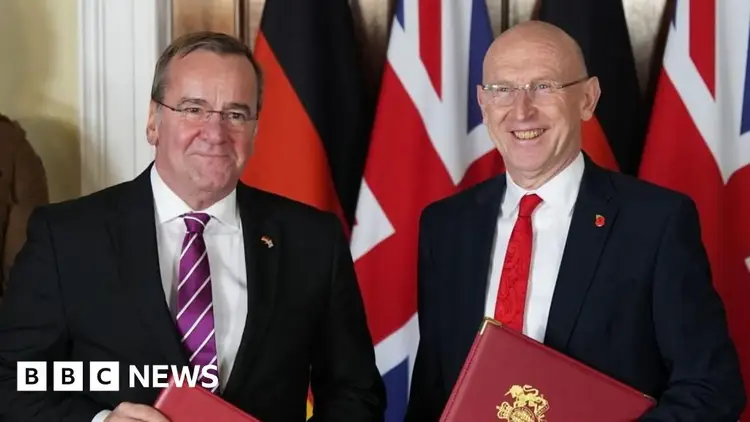UK and Germany sign landmark 'defence' treaty

The UK and Germany have reached a significant defense deal that the UK government describes as a major step forward. This agreement is designed to enhance security, encourage investment, and create jobs.
As part of the deal, the German defense firm Rheinmetall will establish a new factory in the UK dedicated to producing barrels for artillery pieces, which will create 400 jobs.
The two nations will collaborate on creating drones and a brand new long-range missile.
German maritime surveillance planes will periodically conduct patrol missions over the North Atlantic, launching from RAF Lossiemouth in Scotland.
"Today marks an important moment for the relationship between the UK and Germany, as well as in the history of both nations," stated Defence Secretary John Healey during a press conference after the agreement was signed.
"This is the key motivation for our UK defense strategy that prioritizes NATO and for our efforts to improve our relations with Europe," he stated.
While in opposition, Labour pledged to strengthen military relationships with Germany. This initiative is part of a broader effort by the current government to rebuild connections with important European partners following Brexit.
Miguel Berger, the German Ambassador to the UK, mentioned that the European Commission plans to prioritize defense significantly over the next five years, and there will be opportunities for the UK to participate.
Clearly, the pressing question is: what role can the British defense industry and the UK's capabilities play in this collaborative effort? he stated during an interview on BBC Radio 4's Today program.
The UK currently has a defense agreement with France, known as the Lancaster House Treaty, which was signed in 2010 by David Cameron and Nicolas Sarkozy. However, this marks the first such agreement with Germany.
The UK and Germany are the top two countries in Europe when it comes to defense spending and are also the leading European contributors of military support to Ukraine.
Healey described it as a "significant moment," as it strengthens the ties between the armed forces and defense sectors of both nations.
In truth, the two countries are already working together as part of the NATO alliance.
In a collaborative effort, they are also producing new tanks and armored vehicles for the British Army. The partnership between Germany's Rheinmetall and the UK's BAE Systems, known as RBSL, is responsible for creating the Boxer armored fighting vehicle and the newest Challenger 3 tank in Telford, Shropshire.
As part of the newly established Trinity House Agreement, Rheinmetall is set to construct a facility in the UK that will manufacture barrels for artillery guns. This marks a return to production in an area the UK halted over ten years ago.
The location of the factory has yet to be revealed, but the Ministry of Defence (MOD) has indicated that it will create over 400 jobs and utilize steel made in Britain by Sheffield Forgemasters.
The UK Government has recently purchased the steel manufacturer. The initial artillery gun barrels are anticipated to be produced by 2027.
The Trinity House Agreement also outlines a promise to create a new long-range missile. According to the Ministry of Defense, this missile will have greater accuracy and a longer range compared to existing systems, such as the UK's Storm Shadow and Germany's Taurus. Unlike the UK, Germany has declined to provide Ukraine with its Taurus cruise missile.
The UK and Germany are set to enhance their collaboration in creating drones capable of flying in tandem with the Typhoon aircraft used by both nations.
German P-8 maritime surveillance planes will regularly be based at RAF Lossiemouth in Scotland to assist in monitoring the North Atlantic. Other NATO countries have been engaged in similar operations for several years.
Additionally, there is a commitment to strengthen the defenses along NATO’s eastern border. The UK and Germany have already deployed hundreds of soldiers to the Baltic countries as part of NATO’s improved defense strategy in response to Russia’s invasion of Ukraine.
Germany's Defence Minister Boris Pistorius stated that the deal would enhance both Europe and NATO.
"We shouldn't assume that security in Europe is guaranteed," he noted, mentioning that the initiatives in progress would welcome involvement from additional partners.











































